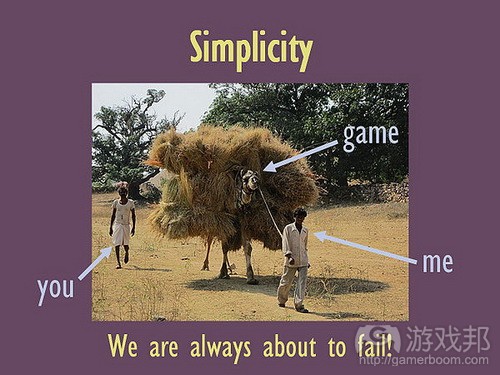简述开发者对游戏研究人员的几点建议
作者:Chris Hecker
我此前曾发表主题为“游戏开发者对研究人员的期望列表”的简短讲话。
下面是内容概要:
游戏开发者总是瞄准学术研究获得灵感,寻找技术问题的解决方案。过去游戏在研究领域并不受欢迎,所以阅读研究论文的开发者通常满足于只是借鉴可利用信息,不就研究方向和陈述内容施加影响。这种情况近来发生改变,游戏重要性的提高令其越发变成关注焦点,甚至变成学术研究的工具。本文主要谈论研究人员提高自身工作价值,有效辅助游戏开发者的系列方式。这些有的只是简单的模式化建议,有的则是全新研究思维视角。
我的讲话主要围绕研究人员不容忽视的若干要素(游戏邦注:若他们希望游戏开发者运用自己的研究成果)。
首先要指出的是性能并非游戏开发者判定研究价值的主要标准,各因素的重要性依次如下:
1. 健全性
2. 简单性
3. 性能
下面就来细述各要素,讨论其重要性所在。
我还谈到为什么研究人员发布算法源代码有助于游戏开发社区评价研究成果,这并非由于我们过于懒惰,不想要自己写代码。我还细述为什么说源代码比文章内容精确。
随后我还谈及研究内容,虽然这些并非具体内容;我只是谈到图像、AI和动画方面不容忽视的局限因素。我建议研究人员多关注感性参数和模式,因为这是我们将某些画面制作技巧模式化,深入理解的渠道。我觉得研究人员参考开发者意见确定研究主题不是明智选择,因为我们通常目光短浅。我觉得若研究人员能够真正理解和体验游戏,然后提出自己的议题,这样会更好(游戏邦注:虽然这并非固定不变的法则)。
我还谈到系列小话题,包括:
* 研究人员若想游戏开发者运用自己的研究成果,就不要申请专利。作者应在文件顶部公开IP留置权,避免读者有不良想法。
* 我不满目前学术内容大多需要付费的现象,建议研究人员将其新旧文章发布到自己的网站。
* 我谈到汇报消极结果的重要性,建议研究人员效法医学研究人员,他们最近刚刚发布《Journal of Negative Results in BioMedicine》,称若既有发行渠道无法发布内容,就将其放到自己的网站。
* 我谈到SIGGRAPH文章的同行评审过程如何迫使我削减许多负面结果和说明,还表示这说明既有同行评审机制已破裂。
* 我反复提到的一个话题是获得游戏真实数据的困难性。我觉得他们遇到的问题是要求开发者向他们提供数据,而非通过众多PC游戏新工具自己挖掘数据,然后说服开发者允许他们在文章中引用。游戏开发者没有时间打包数据,但我想他们很愿意让研究人员使用他们所谓的“真实”数据。和往常一样,Valve总是先人一步,不时向研究人员提供L4D地图。EA也向CMU的Alice项目提供《模拟人生 2》资料。所以我们完全能够获得游戏真实数据,我希望更多研究人员能够这么做。(本文为游戏邦/gamerboom.com编译,拒绝任何不保留版权的转载,如需转载请联系:游戏邦)
A Game Developer’s Wish List for Researchers
“If we aren’t just about to fail, but not failing, we could have made the game cooler.”
Today I gave a short talk at the 2011 ACM Symposium on Interactive 3D Graphics and Games titled A Game Developer’s Wish List for Researchers.
Here’s the abstract:
Game developers have always turned to academic research for inspiration and to find approaches to technical problems. In the past, games were persona non grata in the research community, and so game developers reading research papers had to be content with merely consuming the available information without having much influence on the direction of research, or on its presentation. That has changed in recent years, with games growing in importance as a target and even a vehicle for academic research. Now that we have your ear, this lecture discusses a variety of ways researchers could make their work more useful to game developers. Some of these will be simple formatting suggestions, and some will be completely different ways of thinking about research topics, with various stops and detours in between.
The talk was part of the Industry Session at the conference, where two invited speakers, myself and Dan Baker from Firaxis, spoke about how academic research gets used (or doesn’t get used, as the case may be) in the game industry.
My talk focused on a few different characteristics researchers need to think about if they want game developers to use their research.
First, I pointed out that contrary to the belief that performance is the single overriding factor in the evaluation of research by game developers, the most important factors are, in this order:
1. robustness
2. simplicity
3. performance
Then I went into each of these in detail, talking about the various ways in which these characteristics are important.
I also talked about why researchers releasing source code for their algorithms would be a huge boon to the game development community in evaluating research, and how that’s not because we’re lazy and we don’t want to write the code ourselves. I make a case that the source code is actually more rigorous than the paper in a lot of important ways.
I then talked a little bit about what kinds of things to research, although not about anything specific in this area; I mostly just provided some constraints to keep in mind for various areas like graphics, AI, and animation. I encouraged researchers to look into perceptual metrics and models more, because I see these as a way of formalizing and understanding some of the hacks we all do to get images on the screen. I think it’s actually risky for researchers to look to game developers to suggest research topics, since we are often necessarily short-sighted.[1] I think it may be better for researchers to actually understand and play games, and then come up with their own topics, although that’s not a hard and fast rule, obviously.
Finally, I talk about a laundry list of small topics, including:
* Researchers should not patent their work if they want game developers to use it, and authors should be required to disclose any IP encumbrances at the top of the paper so readers can avoid tainting themselves.
* I rail against the plethora of academic paywalls, and urge researchers to put both their new papers and their older papers on their websites. I will write more on this topic in the future, believe you me.
* I discuss the importance of reporting negative results, and tell researchers to follow in the footsteps of medical researchers, who recently launched the Journal of Negative Results in BioMedicine, saying if existing publishing channels won’t publish them, then put them on your websites.
* I talk about how the peer review process for our SIGGRAPH paper forced me to cut a lot of the negative results and caveats, and how this shows the existing peer review system is broken.
* One topic I touched on, and then came up again during Q&A, and then again at lunch was the difficulty of attaining real data from games. I told people the problem they’re running into is asking for the developers to provide the data to them, rather than simply using the millions of PC game modding tools to rip the data themselves, and then simply asking for permission to use it in their presentations. Game developers don’t have time to package the data up, but I think most would be happy for researchers to use their levels as “real-world” datasets. As usual, Valve is way ahead of everybody here, and occasionally provides L4D maps to researchers (including two of the three shadow talks right after our session!). EA provided the Sims 2 assets to CMU’s Alice program, as well. So, it is possible to get real data from games, and I hope more researchers do this. (Source:chrishecker)
上一篇:休闲游戏并不与“简单”概念划等号
下一篇:解析清除理论在游戏设计中的运用








































 闽公网安备35020302001549号
闽公网安备35020302001549号